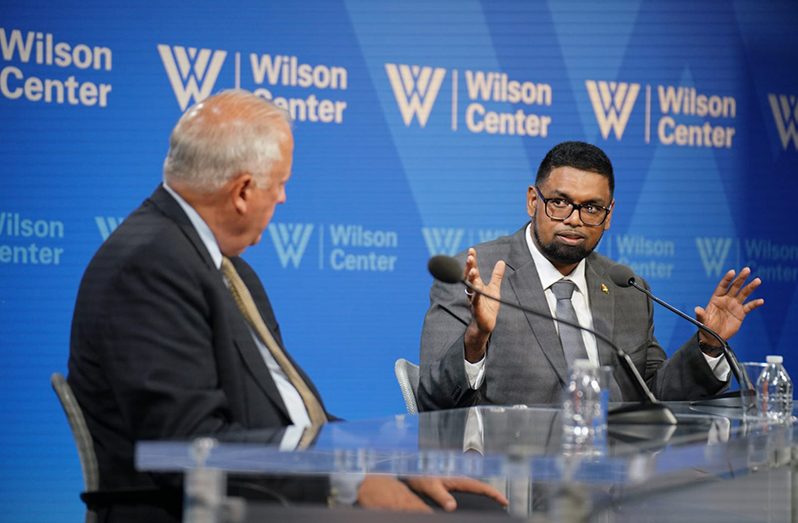–President Ali tells US stakeholders during Wilson Centre engagement
PRESIDENT, Dr. Irfaan Ali, has assured US stakeholders that the government has put in place systems to allow for the transparent management of Guyana’s revenues from its oil and gas sector.
This and other matters related to Guyana’s policy director were outlined by the President during an engagement hosted by the Wilson Centre in Washington DC.
There, he said that his government is committed to ensuring the country’s oil and gas resources are used in a way that does not allow for any misuse or abuse of the funds.
Dr. Ali related that the government, in its commitment to transparency, has employed several systems to ensure that there is trust in the process that governs the oil resources.
The President, in January 2021, signed into law the Natural Resource Fund (Amendments) Bill 2021, which replaces the Natural Resource Fund bill that was passed under the A Partnership for National Unity + Alliance For Change (APNU+AFC) administration, that was already toppled by the successful passage of a no-confidence motion in 2018.
The President noted that the new law dramatically reduced the powers of the minister; added a board of directors; made it compulsory for Parliament to approve spending; added a provision that every receipt must be published in the Official Gazette, and be reported to the National Assembly, among other measures to add extra layers of security.
A cap will take effect at 75 per cent of the second US$500 million deposited into the NRF during the preceding fiscal year, followed by 50 per cent, then 25 per cent, five per cent, and finally, three per cent of any amounts above $2.5 billion.
Those caps are being instituted as a means of ensuring that all Guyanese are better equipped to calculate how their country’s oil earnings are being spent.
It follows an observation made by one of Guyana’s leading financial partners, the Inter-American Development Bank (IDB); this institution had said that the design of the 2019 NRF Act “departs from good practices” and that its complexity may “conspire against fiscal transparency and public understanding.”
President Ali said in keeping with proper financial regulations, all withdrawals of oil revenues must first be deposited into the Consolidated Fund, from which the government could then begin to spend. Requests for withdrawals would also have to be made as part of the country’s annual budget.
In May 2021, the government made its first withdrawal from the Natural Resource Fund (NRF), transferring US$200 million equivalent to G$41.7 billion to the Consolidated Fund to finance national development priorities.
It would be recalled, that as part of the Budget 2022 process, parliamentary approval was granted for a total of US$607.6 million to be transferred during the fiscal year 2022.
“Every cent spent from the revenue will go through the parliamentary process because it has to come through the national budget. Now that is the greatest level of scrutiny. The national budget is subject to parliamentary debate and approval.
“So, the resources that is coming, the revenue that is coming to be invested in the country and the transformation of the country, passes through that parliamentary process, passes through the approval system and process in Parliament because the national budget has to be approved. So, the parliamentary oversight is adding to the transparency process,” President Ali said.
BOARD OF DIRECTORS
The Head of State said that the law further limits the powers of the finance minister, by allowing the fund to be governed by a Board of Directors, comprising no less than three and no more than five members, including the chairperson, who shall be appointed by the President.
These would essentially have to be persons with “wide experience and ability” in legal, financial, business, or administrative matters, one of whom shall be nominated by the National Assembly and one of whom shall be a representative of the local private sector.
The Act requires that all appointments and changes to the NRF Board of Directors be published in the Official Gazette, on the website of the Ministry of Finance, and in at least two of the local daily newspapers.
The board itself is proposed to have a lifespan of two years, after which it shall be “eligible for reappointment.”
“There is an independent Board of Directors that is arm’s length from the government… on that board, we have international people… for example we have David Lammy from the UK, Shadow Foreign Secretary. No, no political reach in terms of the Board of Directors,” President Ali said.
Currently, the board is being chaired by Major General (ret’d), Joe Singh. Aside from Major General (ret’d) Singh, the other members of the board are United Kingdom parliamentarian, Lammy; Guyana’s Permanent Representative to the United Nations, Carolyn Rodrigues-Birkett; former People’s National Congress (PNC) parliamentarian, Dunstan Barrow and Private Sector Executive, Ramesh Dookhoo.



.jpg)










